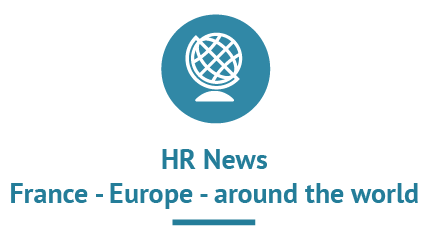|
If you are having trouble viewing this email, open it with your internet browser,
download the PDF version
or contact us.
|
 |
| #21 - January 2020 |
| PDF version - Manage your subscription - Search - Archives |

|
|
vision RH is a newsletter published by the French Directorate General for Administration and the Civil Service (DGAFP). It draws on information sources and reports issued by public administrations, the private sector, international organisations and the press, in several different languages. It aims to provide a broad view of current human resources and civil service initiatives.
|
|

|

|
| Support for staff commitment – a changing public sector's best asset | |||||
|
Staff satisfaction surveys often reveal that a commitment to work, both individual and collective, is increasingly important against a backdrop of changing public service mandates. An OECD study from 2016 found that 23 Member States surveyed public employees on a more or less regular basis about their expectations and motivations. On the other hand, only about ten stated that they used the data to improve their HR strategies. Although the approaches and methodologies differ between countries, the results are fairly consistent: the two main values are carrying out a profession that contributes to the general interest, which is a source of equality between citizens, and benefiting from sheltered employment. However, there has been an increase, linked to a generational shift, in professional recognition and the quality of leadership. English-speaking countries (Australia, Canada, United States, Ireland and the UK) are the most likely to query their public employees about their level of commitment. Effective communication enables these countries to achieve high participation rates and, in line with their commitments to transparency, they publish the resulting data and analyses on government websites. Some countries are also choosing to develop a strong "employer brand" that goes beyond mere recruitment. This is the case with the Netherlands (werken voor Nederland), Sweden (Jobba staatligt), Switzerland and the United Kingdom, where the Civil Service plays an active role in the national "A Great place to Work" competition. A number of initiatives are being taken to encourage commitment and motivation among staff: • In Belgium, the administration uses teamcrafting, a method that consists of adjusting positions within a team to create relevant and motivating functions. This method links a team's activities with individual talents to boost cohesion • In Estonia, where the term pühendhumus (a term that describes both engagement and commitment) is used, training is provided at all levels to ensure high levels of commitment • In the United States, the Office of Personnel Management launched the GEAR initiative (Goals-Engagement-Accountability-Results) with the aim of pooling best practices in terms of transformation, thus aligning organisational and performance objectives • In Ireland, the emphasis is on "Be recognized for your achievements". In addition to being spotlighted within the public service community through distinctions, the latest version of the assessment method (PMDS) now makes it a determining factor. • In Portugal, an "Incentive System for Efficient Public Expenditure" (FEIS) has been set up with the goal of eliciting initiatives that generate improvements. These initiatives must be the result of a team project. An amount equivalent to 50% of the total amount saved is distributed among all employees. Over and beyond everything that contributes to group efficiency within an organisation and in the service of the public, initiatives that target quality of life at work and work/life balance naturally have a strong impact on employees' commitment. |
|||||
|
|||||
|
|
|||||

|
|||||

|

|

|
| Better social protection for Spanish civil servants | |||||
|
An agreement has been signed between the government, the mutual insurance company for public employees (Muface) and four private insurers. In addition to providing free health care and new preventive measures, it will help make better care available to those living in sparsely-populated areas without healthcare centres. The Spanish central government will finance this action by itself, via a 4.5% increase in its employer contributions. |
|||||
|
|||||
|
|
|||||

|
|||||
| Professionalisation of the HR function in the Australian public service | |||||
|
As part of planned civil service reforms and given its strategic role, the HR function will be the first to benefit from a process of professionalisation. A group of experts has been established within the GovTeam community to identify and share best practices and assist in drafting future statutory regulations and organisational texts. |
|||||
|
|||||
|
|
|||||

|
|||||
| A single, shared and independent professional adviser in southwest France | |||||
|
Six département management centres in the Occitanie region have grouped together to hire a single professional to act as an adviser in three areas (ethics, whistleblowing and separation of church and state). The adviser is a former financial judge from a regional audit office; his status as a person "external" to the local authority is perceived as a guarantee of neutrality by staff, who also appreciate having a single point of contact. « This allows a complete analysis of overlapping issues and makes it possible to pool functions »
|
|||||
|
|||||
|
|
|||||

|
|||||

|

|
| The Finnish administration acquires an HR decision-making tool | |||||
|
"Tahti" is the latest version of the HR information system provided by the Finnish government's Shared Services Centre. Designed to be a strategic planning tool, it features more comprehensive individual data (career development, changes in compensation, working time, skills, positions held) but also collective data (satisfaction surveys). In particular, users can carry out projections and simulations. |
|||||
|
|||||
|
|
|||||

|
|||||
| Dedicated, streamlined training for public hospitals | |||||
|
As an intermediary between the hospital civil service's HR departments and sector stakeholders, the French National Association for In-Service Training of Hospital Personnel (ANFH) is gradually deploying a new online tool, LA ForMuLE, which streamlines the management of training in healthcare and medico-social institutions (selection, ordering, follow-up and payment). Another plus: pooled training means optimised public procurement procedures. |
|||||
|
|||||
|
|
|||||

|
|||||
| "COP Agile": a community of Belgian transformation stakeholders | |||||
|
Within the Federal Public Service Policy and Support (BOSA), a Transformation Team is mobilising all stakeholders who are committed to a more agile administration. Six groups have been formed within this new community. They are working on concrete proposals to help organisations evolve by sharing their challenges and initiatives, which are published on a dedicated collaborative space, accessible to all federal public servants. « Thanks to the community, we will be able to discover the added value of agile principles and how to put them into practice »
|
|||||
|
|||||
|
|
|||||

|
|||||

|

|
| EXecuTALKs, webcasts for Canadian public executives | |||||
|
A series of webcasts to share the views and experience of recognized experts – this is the Canada School of Public Service's way to offer new training courses that can reach every federal government executive easily and quickly. This initiative meets a real demand given the increase in the number of connections. |
|||||
|
|||||
|
|
|||||

|
|||||
| New guidelines for evaluating Italian civil servants | |||||
|
Following on from the reform that entered into force two years ago, which correlates individual evaluations and organisational performance, the Italian government is continuing to update its employee evaluation model. In addition to broader use of the 360° assessment, it recommends that measures offered to staff go beyond mere financial incentives and include other forms of recognition (coaching, personal development and internal mentoring). |
|||||
|
|||||
|
|
|||||

|
|||||
| MentorMatch helps the UK Civil Service optimise mentoring | |||||
|
A new application connects public servants seeking mentors with those who want to share their skills with colleagues. The creation of profiles has been deliberately kept to essential elements and LinkedIn users can also import certain data (identity, function and location, areas of expertise). « We hope the app will allow you to find the right person no matter where they are in the Civil Service »
|
|||||
|
|||||
|
|
|||||

|
|||||

|

|
| In the Swiss federal public sector, commuting time becomes working time | |||||
|
A directive on "Forms of Mobile Work Arrangements in the Federal Government", which came into effect on 1 January 2020, states that staff may work during a journey if the duration and means of transport are compatible with the task to be performed. The employees concerned will thus be able to request that their commuting time be counted as working time. This decision is in response to a joint request from the four trade unions. |
|||||
|
|||||
|
|
|||||

|
|||||
| Psychosocial risk training for Danish public managers | |||||
|
Aware of management's role in preventing psychosocial risks, the government's HR department is setting up dedicated training courses. Negotiated as part of the most recent collective agreements (OK 18), these courses aim at boosting managers' knowledge and providing them with concrete tools to prevent and manage difficult situations that their employees may experience in their professional environment. |
|||||
|
|||||
|
|
|||||

|
|||||
| US federal government collective bargaining agreements go online | |||||
|
Under the terms of a recent executive order, every collective bargaining agreement – some 800 currently – between US Federal agencies and unions will be put in a database and put online in the near future. The aim of this decision is to make available to the general public not only the signed agreements, but also all of the elements from the negotiations (position of each stakeholder). « The users of the database will be able to transparently make queries by keyword and filter by agency, union and / or validity date »
|
|||||
|
|||||
|
|
|||||

|
|||||

|

|
| "Helping the Helpers", Casino's response to a genuine social issue | |||||
|
According to INSEE, nearly one in five employees in France has a close dependent. This is a situation that the business world cannot ignore and the Government has made it one of its priorities. The Casino Group is a trailblazer in this field. Its efforts began with a series of conferences in which the expectations of those concerned were gathered. A comprehensive support system was then put together over the years. It also served as inspiration for the Mathys Act, which allows employees to donate accrued leave to colleagues. In addition to the cap of 12 days per year stipulated in an agreement1, Casino employees can now benefit from:
Aware that this is an often sensitive area, Casino's HR department underscores that this approach will continue to evolve in order to improve the working life of employees who must care for a family member. |
|||||
|
|||||
|
|
|||||

|
|||||

|

|

|
|
Share
|
||||
|
||||
| SUBSCRIBE - UPDATE YOUR SUBSCRIPTION - ARCHIVES - RSS - UNSUBSCRIBE |
|
French Directorate-General for Administration and the Civil Service (DGAFP)
Publication Manager: Thierry LE GOFF Managing Editor: Xavier MAIRE Editor-in-chief and Autor: Jean-François ADRIAN Layout and graphic design: Jean-François ADRIAN and Aphania. The texts of the publication do not reflect the point of view of the DGAFP
In accordance to the French Act n°78-17 of 6 January 1978 on information technology, data files and civil liberties and to the european General Data Protection Regulation (GDPR), your personal data is stored securely and you are entitled to access, correct and delete them. To do so, you should send an e-mail to (contact-visionrh@kiosque.bercy.gouv.fr) or write to DGAFP: 139, rue de Bercy - 75012 Paris; France.
Reproduction is authorized with mention of the source © DGAFP 2020 / N° ISSN: 2606-7528. |
|
|




